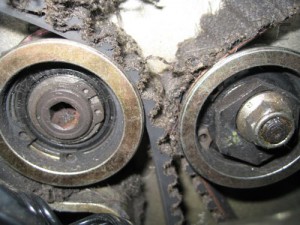Timing Belt Symptoms
A timing belt handles the timing of the engine’s valves. If a timing belt snaps, certain kinds of engines could be damaged. It’s better to replace the timing belt if you have hit the amount of miles your vehicle manual recommends for a replacement, or if you notice some symptoms signaling which the timing belt is going bad.
There’s two different kinds of engines: interference and non-interference. In case your timing belt snaps or slips on an interference engine, the engine is going to be badly damaged costing a small money in repairs. In case a timing belt snaps on a non-interference engine, the engine is going to be damaged but won’t cost too much in repairs as an interference engine.
The failure of a timing belt is probably the most typical main reasons why cars breakdown. If you’re acquainted with the timing belt, the way it functions and the way to recognise whether or not some thing is wrong with it, you’ll be able to avoid serious damage to your vehicle and you will know when you should replace it. Know-how about timing belt symptoms could save you from having to experience being stuck on the side of a road due to a broken timing belt.
With no correctly functioning timing belt, an engine’s pistons would stop to operate therefore a vehicle will be not able to work. Worn timing belt can’t perform its job appropriately for this reason old timing belts can result in performance issues with a vehicle.
Now there are several timing belt symptoms to take into consideration: if the car’s engine vibrates a lot which it leads to the whole car to shake, in case your car starts belching much more exhaust than normal, if you encounter difficulty in starting the car or in the event you hear strange noises from the car’s engine. These types of are just some of the common timing belt symptoms. In the event you encounter one or more of those it might be ideal to consult with a mechanic as quickly as possible. Other timing belt symptoms can vary then one of them is emitting of excess smoke. When your car emits smoke a lot more than the usual that is a sign which your timing belt could have a issue.
These are the basic timing belt symptoms that you need to watch out for if you wish to prevent causing major damage to your car’s engine. Some of the reasons for timing belt damage are oil leak and getting too hot. To prevent these issues it’s better which you carry out regular check-up for your vehicle. If you’d like to learn more about timing belt as well as other timing belt symptoms, you could browse the internet for websites which has this type of information.
If you have ignored the symptoms and your vehicle conks out and stops running it’ll probably are already too late. So keep in mind, at the time you notice these timing belt symptoms it might be better to get your car checked. Awaiting the damage to become severe is certainly not something you will want to do.
 The failure of a timing belt is one of the most common reasons why cars break down. If you are familiar with the timing belt, how it functions and how to identify whether or not something is wrong with it, then you can prevent serious damage to your car and you’ll know when to replace it. Knowledge about timing belt symptoms will save you from having to experience being stuck on the side of a road because of a broken timing belt.
The failure of a timing belt is one of the most common reasons why cars break down. If you are familiar with the timing belt, how it functions and how to identify whether or not something is wrong with it, then you can prevent serious damage to your car and you’ll know when to replace it. Knowledge about timing belt symptoms will save you from having to experience being stuck on the side of a road because of a broken timing belt.
